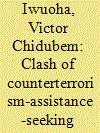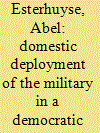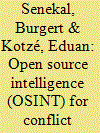|
|
|
Sort Order |
|
|
|
Items / Page
|
|
|
|
|
|
|
| Srl | Item |
| 1 |
ID:
168435


|
|
|
|
|
| Summary/Abstract |
Decade-long security cooperation and counterterrorism engagements in Nigeria have failed to bring down Boko Haram or at least weaken its terrorist structures and transnational spread. I argue that disconnects between counterterrorism-assistance seeking states and their superpower sponsors are implicated in the intractability of Boko Haram's insurgency in Nigeria. Why is the U.S. counterterrorism intervention to individual MNJTF countries (i.e. troop contribution, military funding and intelligence support) ‘lopsided’, ‘fragmented’ and ‘unevenly distributed;’ and how are these implicated in the fight against Boko Haram terrorism? This has impacted negatively on MNJTF countries – lack of cooperation, divisiveness and individualism in coordinating and forging offensives against Boko Haram. These concerns interface several blind spots in the picture of external influences on military’s approach to Boko Haram. I elicit primary data from top military officers. I conclude by predicting the implications and consequences of these counterterrorism complexities, and their potency to defeat or encourage Boko Haram terror.
|
|
|
|
|
|
|
|
|
|
|
|
|
|
|
|
| 2 |
ID:
168433


|
|
|
|
|
| Summary/Abstract |
The paper aims at providing a brief analysis on key realities underpinning the debate on the domestic deployment of the South African armed forces. The theoretical analysis highlights the divergent reality of shrinking budgets and capabilities, and a growing operational schedule confronting militaries in the contemporary era. This is exacerbated by a threat agenda that necessitates armed forces to downscale and police forces to upscale in order to address a threat reality that is neither predominantly external nor exclusively internal in nature. The South African military is fortunate to have access to a long history of domestic deployment that suggests key guidelines for future thinking about internal deployments. The revival of internal military deployment will confront the South African Defence Force (SANDF) with critical trade-offs in decisions about distribution of its resources, sustaining current internal and external deployments, command and control structures, facilities, and key personnel and equipment deficiencies. Routine participation in internal operations, in effect, implies a re-invention of defence policy and SANDF strategies for force development, force deployment, and force employment.
|
|
|
|
|
|
|
|
|
|
|
|
|
|
|
|
| 3 |
ID:
168434


|
|
|
|
|
| Summary/Abstract |
With the advent of the information age, Open Source Intelligence (OSINT) has gained special prominence in the Intelligence Community (IC). However, the era of big data has brought numerous challenges in handling OSINT, in particular because big data comprise large volumes of unstructured data that are generated continuously. In this article, we discuss the use of OSINT in the era of big data, in particular how it relates to compiling event data, but also show that large projects with an international focus such as the Integrated Crisis Early Warning System (ICEWS) are inadequate to study political instability in the current South African context. We shift our collection efforts from mainstream media to the analysis of WhatsApp messages, since this platform has recently gained popularity and it is widely used in South Africa. We show how we build an automated data pipeline that provides near real time data on the occurrence of mass violence in South Africa. For this analysis, we make use of Natural Language Processing (NLP) toolkits in Python and build interactive dashboards to monitor the state of mass violence in South Africa.
|
|
|
|
|
|
|
|
|
|
|
|
|
|
|
|
| 4 |
ID:
168436


|
|
|
|
|
| Summary/Abstract |
Natural resource-based conflicts continue to occur in different parts of Nigeria with negative implications. This study investigated the phenomena of natural resource conflicts vis-à-vis their propensities to impact political economy and national security negatively. Data for the study were sourced from theoretical and empirical evidence. Empirical data were sourced from existing studies selected on the basis on their relevance to the study and analysed based on their content. The limitation to this approach is the obsolete and subjective nature of some the literature. This limitation was, however, addressed among others through the author’s knowledge of the issues under study. The study found that Nigeria is enmeshed in conflict over ownership, distribution, access to or competition over natural resources such as petroleum resources and agricultural land and these conflicts have undermined democracy, human rights, the economy and the nation’s security. The paper identified poor resource governance, environmental factors and poor political leadership as the causes and drivers of these conflicts. It recommends natural resource governance among others, as a way out of the problem.
|
|
|
|
|
|
|
|
|
|
|
|
|
|
|
|
|
|
|
|
|